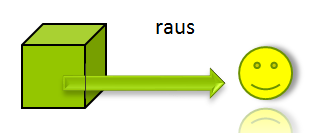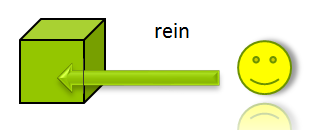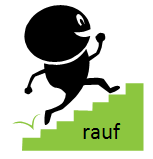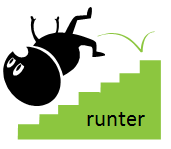The adverbs
hin and
her cause much confusion for German learners. There are no direct equivalents of either of these in English and to English speakers they often seem superfluous in a sentence. German in fact signifies directional movement (vs. position) in several ways that English does not. The adverbs
hin and
her are examples of this specification of movement in a particular direction or from a point of origin.
hin generally indicates movement in a direction
away from the speaker
toward a particular destination.
| Wir gehen zum Hafen hin. |
We are going to the harbor. |
| Schau mal hin! |
Look (over there)! |
her generally indicates movement
from a point of origin in a direction
toward the speaker.
| Komm mal her! |
Come over here (from there)! |
| Wo bekommen wir das Geld her? |
Where will we get the money (from)? |
Hin and
her are used in their most literal sense with verbs of movement (e.g.,
gehen to go,
kommen to come) or activity that involves direction (e.g.,
sehen to look,
geben to give,
reichen to hand over). Often they appear as separable prefixes (e.g.,
herkommen ,
herholen,
hinlegen, hinschreiben). More specific directional adverbs are created through a number of compounds that combine
hin and
her with prepositions that denote direction (e.g.,
herauf,
herab,
heraus,
herein,
hinauf,
hinüber,
hindurch,
hinzu) or with other adverbs (e.g.,
hierher,
woher, dahin,
überallhin).
| Er geht die Treppe hinauf. |
He is going up the stairs. |
| Er kommt die Treppe herunter. |
He is coming down the stairs. |
| Der Apfel fiel vom Baum herab. |
The apple fell (down) from the tree. |
| Der Apfel fiel ins Gras hinunter. |
The apple fell (down) into the grass. |
Note in particular the contrasting examples with the apple. Here, the perspective of the speaker is unclear. Is the speaker in the tree? Under the tree? Beside the tree? But the additional prepositional phrases specify respectively movement
from a point of origin (
vom Baum), in which case
her is used, and movement
toward a particular destination (
ins Gras), in which case
hin is used.
The adverbs
hin and
her also appear in expressions with extended meanings. They occur for instance in time expressions (e.g.,
eine Weile hin a while longer still,
schon viele Jahre her many years ago). They also appear in a number of fixed idiomatic expressions (e.g.,
hin und her back and forth,
hin und wieder occasionally,
hinter dir her behind you [and moving in the same direction as you],
auf seinen Rat hin at his advice,
von der Erziehung her on account of one’s upbringing). And they occur as verb prefixes with sometimes abstract or figurative meanings (e.g.,
herstellen to produce,
hinrichten to execute).
Finally, in actual everyday usage the lines between
hin and
her are blurred. While southern German speakers tend to maintain the distinction between the two adverbs, in German spoken north of the Main River
her is favored in most situations regardless of direction or perspective, and this is commonly reduced to
‘r (
herüber >
‘rüber,
hinaus >
heraus >
‘raus).
No wonder
hin and
her cause confusion for learners! Apart from being aware that these variations exist, the basic guidelines of
movement toward a destination (
hin) and
movement from a point of origin (
her) can at least provide a useful point of reference.
With other adverbs they aren‘t directly combined. Instead, they go with the verb.
 The questions „woher?“ and „wohin?“ ask about direction.
They can be written together or separate.
„Wohin gehst du?“ – „Wo gehst du hin?“
„Woher kommst du?“ – „Wo kommst du her?“
The questions „woher?“ and „wohin?“ ask about direction.
They can be written together or separate.
„Wohin gehst du?“ – „Wo gehst du hin?“
„Woher kommst du?“ – „Wo kommst du her?“

 rein = hinein / herein
rein = hinein / herein
 rauf = hinauf / herauf
rauf = hinauf / herauf


